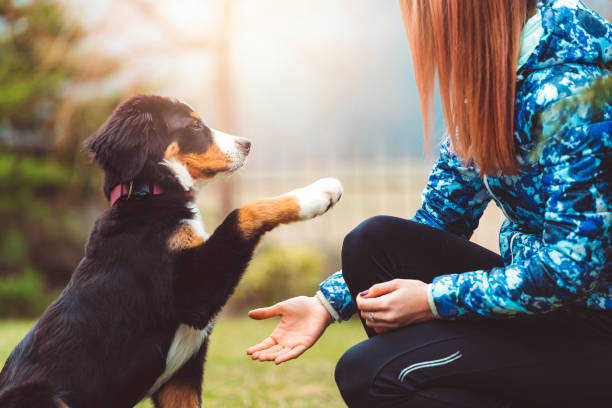What is the first thing you should train your puppy

You will be training your puppy from the moment you take it home! Puppies start learning from birth, and some training can begin as soon as they open its eyes and walk. Young puppies have short attention spans but you can expect them to begin to learn simple commands like “sit,” “down,” and “stay,” as young as 7 to 8 weeks of age.
Hi my name is Dr Evan Shaw and I am a small animal practicing veterinarian (dogs are definitely my jam). I’d love to share my expertise on puppy training and the most important steps to tackle first. For me (and most owners) toilet training is the reason for most consternation and stress (and the pup too, they just want to please you!). If you take care of the “out and the in” first the pup will have 2 major rules they can base their training off. Giving them a good foundation for the “do’s and don”ts.”
What is the first thing you should train your puppy
1. “You eat here.” Food is a great reward and training tool (ask my wife) and it’s easy to place your pup’s food in one place from the get go. Routine is king with a puppy so pick one place and stick with it. Feed your little mate at the same time each day, and before your pup eats a simple “sit” before eating is the easiest place to start. Remember to start with small things. We can’t expect a puppy to sit, shake and pirouette their first time. With your pup beginning with an understanding of the “trick for food” trade we can build on a solid reward structure making their ongoing learning far easier.
2. “You pee/poop here.” With this your alarm is key (and treats). This may seem like a bit of work, but a few short sharp days of this will save a LOT of heartache in the future. Set your alarm for every 60 minutes. Each hour take your pup outside where you want them to go. Hang with your dog for a bit until they go and LOTS of treats/pats/praise when they do. Then next hour, do it again. My dog took about 2 days with this approach and he’s the toilet champion king!
If you do one or two things from the very get go you can have a much easier transition into a new pup with fewer stressful events. Most importantly HAVE FUN with your new bestie during training. This will help build that special bond between you and make it fun for you too and not a chore.
